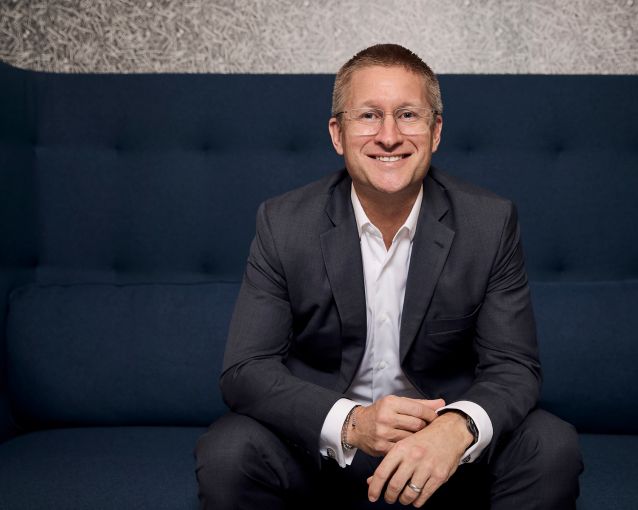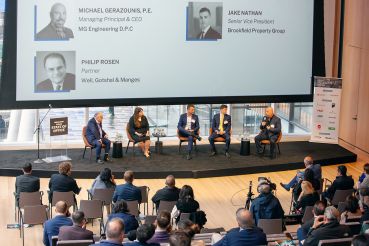CBRE’s Craig Hudleston on Leading a New Approach to Operations
By Andrew Coen May 8, 2024 6:00 am
reprints
Craig Hudleston has been spending plenty of time on airplanes flying from his home in Singapore to New York since his promotion to global chief operating officer for CBRE (CBRE) Property Management in August 2020. Now, he’s set his sights on piloting the brokerage’s newly launched investor portfolio management (IPM) service to new altitudes.
Hudleston will soon be relocating permanently to CBRE’s New York office to tackle the IPM role, which grew out of business created through a partnership with Brookfield (BN) Properties announced in January. The two companies under Hudleston’s guidance are striving to boost the value of Brookfield’s extensive U.S. office portfolio through enhancements to property management and tenant services.
An Australia native, Hudleston spoke with Commercial Observer on his most recent visit to New York about his journey into the global commercial real estate profession, the impetus behind deciding to organize an IPM model with Brookfield, why portfolio-level outsourcing is beneficial for CRE owners, and his outlook on the future of the U.S. office sector. The interview has been edited for length and clarity.
You grew up in Australia and graduated from the University of New South Wales with a bachelor’s in engineering. When you were in college, did you envision a career in commercial real estate?
Craig Hudleston: Originally that degree was a degree in land surveying and it ultimately became a bachelor of engineering in geomatics, a study of measurement. So it was a natural flow for me, which progressed from doing broadacre subdivisions out in the northwest of Sydney to mixed-use development sites and then into project management. That ultimately led me into a variety of project management roles, both new-build and corporate fit-out work, and then I ultimately made a move into CBRE through our project management team.
So, I was always involved in property management in one way or another and was always interested in real estate, and it flowed into working in corporate real estate and what ultimately now is property management. I’ve had a really great journey through CBRE both on the occupier and the investor side where I’ve been given great opportunities to look at leasing, occupier outsourcing and property management.
Prior to your appointment as global COO for CBRE Property Management in August 2020, you gained more than 20 years of real estate experience working in Australia, the U.K. and Japan. What did you learn from seeing the real estate business in different countries that has helped in your current role?
There are always core fundamentals that are the same, and then there are a lot of nuances that are different, market to market, in the way that the market operates, the way that clients set up and structure themselves from an outsourcing perspective, and the different cultural elements.
So, the ability to be able to work through those nuances and having worked within each of those markets individually before taking on a global role really helped me to be able to then guide our teams and support some of those other parts of our management team that haven’t necessarily worked in a lot of different cultures and markets.
It has also helped in the ability for us to be nimble, think differently, and be able to adjust and know that one direction is not always going to work in every one of our markets.
While we look to drive as much standardization and consistency as we possibly can, we also have to respect and reflect the local nuances within certain markets, and the ability to do that within my role is really important.
You took on your expanded role during the height of the COVID-19 pandemic. What was that experience like trying to adjust to this new position amid so many uncertainties in the CRE industry?
We had teams that didn’t meet each other for the better part of three years, so a lot of your role where you could be directly working with people in certain markets became remote roles. So we had to adjust our leadership style to be able to accommodate that.
We didn’t have the ability to meet with clients directly as we had for so long, so we then relied a lot on historical relationships. I think, for us, given the depth and breadth of our service and then the expertise that we held internally, we were able to adjust very quickly and we were able to advise significantly around some of the challenges that some of our clients were facing.
You are now heading up CBRE’s new investor portfolio management business, launched early this year, in concert with a new strategic partnership that was formed with Brookfield Properties. What was the impetus behind creating this initiative?
We always could see that there was a market shift coming, and we have a fund accounting business that works within this realm of that, but we could start to see the consolidation with many of our institutional clients who were looking for consistency.
We’ve been thinking about it a lot, and then the opportunity with Brookfield came up. And, as we worked with them, it became very clear that it was very important to build a true partnership, and we couldn’t do that by sitting within our day-to-day core property management delivery business. It was very clear for us that while we had this intent, it was through the Brookfield partnership and the discussions with them that the IPM model became very clear and that we had to set it up. While we knew that the market was moving that way, working very closely with Brookfield really galvanized exactly how and what IPM needed to look like for us to be able to set this all up.
How can your portfolio-level outsourcing from CBRE aid a company like Brookfield moving forward, especially given its extensive office portfolio footprint?
Brookfield has 65 million square feet of office and 100 assets, but we’re almost managing 10 times that in the U.S. alone. So for us it’s bringing the scale that we can to Brookfield and bringing best practices, but it’s also working with them to be able to develop this model of delivery that brings the best of both worlds for them.
Brookfield is an incredible organization and has run a great operation. They’re very focused now around asset management and the strategy of those assets, and we’re deeply focused on the operations of those assets. For us to be able to bring them data points and benchmarking to make better decisions at the asset management level around those assets is what is really going to benefit them.
We have centers of excellence within the U.S. and around the world that we’re leveraging to better drive and deliver efficiency for them. While they had ambition to do that, they really ultimately couldn’t get there because they had to prioritize elsewhere.
The investments that we have made and the investments that we’ll continue to make in thinking about and delivering property management, accounting and engineering services is really going to drive value for them.
What is your view on the future of the U.S. office sector post-COVID, and how does it compare to other countries you track closely?
Return to the office continues to be a lot slower than people would like. A lot of that is occupier-driven, and I think the occupiers are still trying to work out what their strategies are post-COVID and what that working relationship is and where the macroeconomics are to support and drive that. These are all variables that I think in the short term are challenging for big institutional owners who have office assets, and I think in the short term that’s going to remain.
For us, I think the U.S. is probably a little more challenged. Asia, for instance, is much more back in the office because they have much smaller dwellings to live in, and so naturally working from home is just not as easy and comfortable. But I think around the world it’s definitely a sector that’s continually challenged on the investment thesis at the moment, but the U.S. at the moment is definitely at the forefront of that.
You’ve been living in Singapore the last two years but are going to be making a move to New York very soon. What is the goal behind this, and how do you think it will impact the partnership with Brookfield?
A big portion of our global property management business is in New York and the Brookfield relationship is a big one for us. But, also, for me to get closer to our core business and our overall leadership has been a big driver for that decision.
We also see that there is great opportunity with the IPM business here in the U.S., both through consolidation and what we’re seeing with our institutional clients, but also first-generation outsourcing. We are seeing it as a trend and not just here in the U.S., but in places like Australia. We’ve recently expanded a relationship with one of the big real estate investment trusts [REITs] in Australia and we manage three of the biggest REITs there. We’re talking to people in the Middle East and we’re talking to people in Europe, but we still think that, just given the size of the real estate market here, that the opportunity is significant in the U.S., and that’s really driven us to look at positioning with both my global COO and the new IPM head role here in the U.S.
This will certainly cut down on your flight travel.
Once-a-month, 24-hour flights have been a bit challenging, but I’m definitely looking forward to less time on planes.
Speaking of New York, there are a lot of Class B properties in the Big Apple. Do you envision there being a lot of residential conversion opportunities or even some hybrid buildings that incorporate some office and apartments together?
This is being talked about a lot both in New York and and all around the U.S and globally, but, I think, as everyone is looking into this, there are immense challenges around those conversions, both on the financial and practical sides. In theory it sounds great, but in practice it’s a lot more challenging than I think people really understand, so there’s going to have to be some financial incentives that are going to need to be put in place to be able to drive that.
But just walking around New York you see a lot of these buildings that are derelict at the moment, and something definitely needs to be done. Whether residential is the right solution needs to be worked through on a project-by-project basis.
On a lighter note, you probably don’t have much free time, but what do you enjoy doing outside of work?
I love cycling, and the weather has improved here so I’ve started enjoying getting out and spending a little bit of time riding around the park, which is nice, and I need to do a little bit more exploring. Having spent a long time in Japan I’m quite an avid baseball follower and a mad sports follower in general, so the U.S. definitely provides a really great amount of excitement with that.
And my kids both love sports, so I’m looking forward to taking them out to a ballgame and experiencing new sports in the U.S. that they probably haven’t been exposed to before.
Andrew Coen can be reached at acoen@commercialobserver.com.


